The Rhetoric of Redmondism 1914-6
Published in 20th-century / Contemporary History, Features, Issue 1 (Spring 2003), Volume 11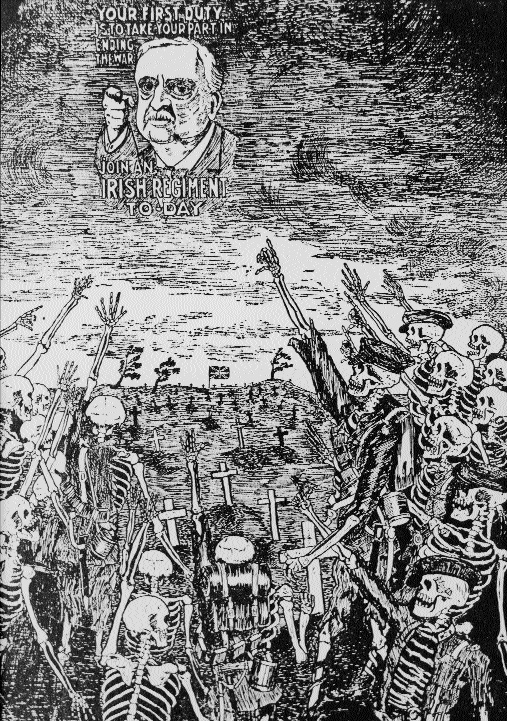
Sinn Féin anti-recruitment poster . (National Museum of Ireland)
John Redmond and his party have been treated kindly by academic historians. For the most part, they have accepted the view of his followers, Stephen and Denis Gwynn, that he was a man of immense achievement brought low by factors outside his control, notably the chauvinism of the British War Office and the literal bloody-mindedness of Irish Republicans.
This attitude involves taking a considerable amount on trust, which involves, in turn, ignoring certain aspects of Ireland’s history during the First World War, particularly the period before the Easter Rising. Most notably, the arguments used by Redmond and his allies to justify Irish participation in Britain’s war effort have not been given anything like the textual analysis awarded their revolutionary opponents.
Quite apart from the general undesirability of such neglect, there are three reasons for ending it. In the first place, the pro-war propaganda of Redmondism reached far more people when it was presented than the anti-war propaganda of Connolly, Pearse and Griffith (which helps explain the latters’ greater shrillness). Secondly, and related to this, the Redmondite propaganda can be said to have got more Irish people killed in the four years of the First World War (10,000 according to Joe Lee) than Pearse and his allies can be blamed for sending to their deaths in the 87 years since 1916. Thirdly, the arguments of the Home Rule MPs before the Easter Rising, and in the light of events immediately following, help explain the apparently sentimental and emotional reaction against constitutional Irish nationalism in the second half of the world war.
Not all constituencies satisfied with Home Rule
As late as 4 October 1914, Redmond was able to boast at Wexford without too much exaggeration: ‘Every one of my promises have been fulfilled’. He knew well that this honesty was beginning to be compromised. Though the Home Rule Act was on the statute book, the problems that had delayed its passage were not resolved. In part, they grew out of the very demand for ‘home rule’, a name which promised any and everything. It had begun in the 1870s as something less than sovereign independence but more than the union status quo, based on the new and then unique dominion status of Canada. Since then, dominion status had improved while that of ‘home rule’ had declined. As passed in 1914, the Home Rule Act provided for an elected assembly subordinate to that of the United Kingdom in matters of finance and foreign affairs, including trade and defence. This was acceptable enough to the Irish Party’s constituency: Ireland’s male householders, their numbers dominated by a rising national bourgeoisie. Most of their aims had been satisfied, but they still lacked control of the national administration. There were others who wanted more. Those who had failed to find their family economies sufficient to maintain them worked in Ireland and as emigrants abroad to organise the division of estates even within the landlords’ demesnes and the building of Irish industries within the tariff walls excluded from the Home Rule settlement. Some of these outsiders were moving further: towards the working-class movement and socialism. They had their influence limited by the narrow franchise, but their demands were real, as the Irish Party had learnt from its struggle with Griffith’s Sinn Féin and, most recently and dramatically, with the Labour Party in Dublin.
Limited perspectives were paralleled by a limited political strategy. In the 1880s, Parnell had manoeuvred the Home Rule cause between British Liberals, British Conservatives and Irish Republicans. Then the Conservatives had joined the Unionist Alliance, now Party, and made opposition to Home Rule their central principle. On the other side, those who wanted more than Home Rule had kept the Irish Party at arm’s length after it ditched Parnell. Home Rule had become as dependent on British Liberalism as it was on Irish electors.
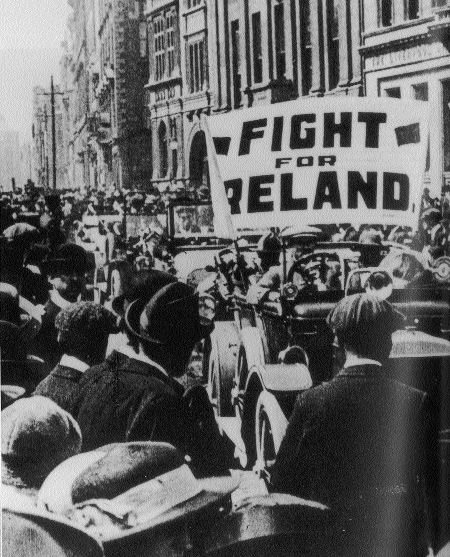
A Royal Dublin Fusiliers recruiting parade. (George Morrison)
Only Liberalism’s own dependence on the Irish Party since the 1910 elections had let the Home Rule Bill be presented at all. Its passing without implementation six weeks after the outbreak of world war gave the Home Rulers new reason to show themselves worthy of Britain’s trust lest the new act be watered down after the war. The men without property disagreed.
Irish Party’s organisational weakness
The party’s need was increased by organisational weakness. In most constituencies it was too strong to be challenged in elections. This favoured the sitting members. Stephen Gwynn MP admitted that his party contained the smallest proportion of MPs of military age. Nor did the younger MPs enjoy their senior colleagues’ moral prestige. Most of them could have fitted comfortably onto future Dáil Éireann backbenches; one or two would do so.
John Redmond recognised the organisational problem; he himself had fostered the underlying crises of programme and strategy. Though he had denied the logic of the Liberal alliance in defence of his hero, Parnell, he embraced that logic to go further than many former anti-Parnellites to prove his loyalty to his British allies by giving their war effort active support, particularly in recruitment.
Of course, this policy involved abandoning Daniel O’Connell’s dictum that Irish freedom was not worth the shedding of one jot of blood. In fact, the Irish Party had found it necessary to abandon this in its oratory, if not in its practice, in order to show itself as legitimate heir to the mid-century Republican insurrectionists. Its new course was that of recruiting for, rather than against, British forces. A more potent rationalisation was, as believed by most of the Home Rule MPs, that the war would be over by Christmas 1914 anyway.
One, and perhaps a second, consideration influenced Redmond particularly. In the first place, he really did believe that the war was one of good against evil. In this he was probably at one with most of his parliamentary colleagues, but there was considerable dissent, most notably from the joint party secretary, John Dillon, who was also its foreign affairs expert. (His opponents caricatured him as knowing more about foreign than about Irish affairs.) Even Dillon did not challenge his leader openly; the party had to hang together and maintain British goodwill. The best way to keep the latter was by recruiting for the dominant power’s war effort, and in this task the comparison between Britain granting Home Rule and Germany occupying Belgium was just too easily made.
Reconciliation
Redmond’s final justification seems to have been shared only by his immediate family and by the other party secretary, Joseph Devlin. Indeed, it is uncertain how deeply they believed in it. However, it has been argued, most recently by Paul Bew in Ideology and the Irish Question, that his main concern was to provide a context for reconciliation within Ireland between nationalists and unionists and thus avoid the main threat to the Home Rule Act: partition.
Were this Redmond’s aim, it is remarkable that he did little to educate his party in it. Indeed, as will be seen, much of its propaganda tended to counterbalance this perspective with one running counter to it, both being merely strands among others in a mass of arguments that would be discredited in the aftermath of Easter Week.
Redmond’s most telling expression of his desire for reconciliation was made in his speech to the House of Commons on the passing of the Home Rule Act:
The two things I care most about in this world of politics are, first of all, that the system of autonomy which is to be extended to Ireland shall be extended to the whole country and that not a single sod of Irish soil and not a single citizen of the Irish nation shall be excluded from its operations.
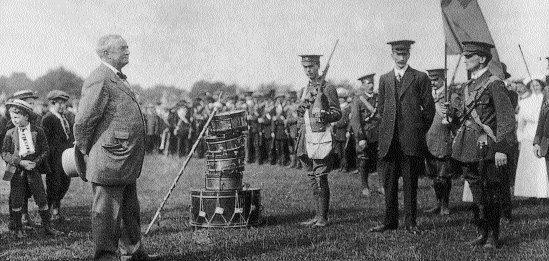
John Redmond addressing Irish Volunteers weeks before the movement split on the war issue. (George Morrison)
Let us say—and this may surprise some honourable members—but it has honestly been my view all through—that the second thing I most earnestly desire is that no coercion shall be applied to any single county in Ireland to force them against their will to come into the Irish government. At this moment, as everybody knows, these two things are unfortunately incompatible. Will they be incompatible after an interval of some months, as those months will be occupied by the Irish people at home? No, sir, I do not believe they will. (Cheers)
During that interval Catholic nationalist Irishmen and Protestant unionist Irish from the north of Ireland will be fighting side by side on the battlefields of the continent and shedding their blood side by side. At home in Ireland, Catholics and Protestant Ulstermen will, I hope and believe, be found drilling shoulder to shoulder for the defence of the shores of their own country, and the result must inevitably be to assuage bitterness and to nullify the hatred and misunderstanding which have kept them apart.
Like most Irish nationalists, Redmond had never really seen Unionism as more than a movement of Ascendancy Protestants manipulated in the interests of the most predatory landlords, capitalists and militarists. Only one ignorant of the real differences that played into the hands of this reactionary coalition could have suggested that they would be dissolved by participation in a foreign war. Certainly the Unionists might have corrected this idea but they were not there, having left the House en masse in protest at the passing of Home Rule.
Redmond was addressing the converted: firstly his Liberal and Labour allies, on whose goodwill there still depended the prospect of Home Rule moving from paper to reality, and secondly the nationalist people of Ireland, whose cooperation in the British war effort—even to fighting ‘on the battlefields of the continent’, as he would urge his Irish Volunteers a few days later at Woodenbridge—might ensure, extend and deepen this goodwill. The reconciliation argument was intended to make recruiting easier.
Nationalist triumphalism
It was not needed. The passage of the Home Rule Act had created a euphoria in nationalist Ireland. The resulting nationalist triumphalism was the greater in that for many the act became identical with the fact of Home Rule. In Dublin on 25 September Redmond declared that ‘Ireland’s right to autonomy has been conceded by the democracy of Great Britain’. He added that if Britain lost the war, Ireland would be ‘ravaged’. His followers were less restrained. On 30 September, at a meeting of Tipperary South Riding County Council, a certain Councillor Edward Anglim declared that ‘Redmond was really, if not technically, Prime Minister of Ireland and the Irish people should look to him as such’. Neither his fellow councillor John Cullinan, MP for Tipperary South, nor anyone else tried to correct him.
Two days later, Thomas J. Condon MP (Tipperary East) compared the still-projected Home Rule parliament favourably with that of Grattan, ignoring its subordination to Westminster on major issues. Redmond himself tolerated these illusions. They helped recruiting; recruiting would strengthen nationalist Ireland’s role in the Entente victory; this would ensure full Home Rule, and doubters (like MacNeill’s Irish Volunteers) would be silenced. At his native Wexford on 4 October he did revive briefly the reconciliation theme:
One blessed result may come to Ireland, and that is that the blood shed side by side, in the field of battle by Catholics and Protestants, by north of Ireland Irishmen and south of Ireland may prove to be the seed of the future unity of our Irish nation.
He found it necessary to balance this with a warning that Irish nationalists would use increasingly in the following months: ‘If it ever came to force, which God forbid—and we all know it never will—but if it did come to force, two can play at that game’. His brother William was less inhibited: ‘We have won for Ireland the right to govern herself on her own soil and according to her own ideas’. On 11 October, in his constituency of Waterford City, John Redmond echoed this: ‘Home Rule has been carried, and all that now remains is a matter for adjustment and arrangement’. But reconciliation was even more of a pious hope: ‘I pray that the coming months may see day to day the gradual but sure disappearance of the differences that yet remain’.
On 18 October, at Kilkenny, he abandoned reconciliation altogether. Triumphalism was total:
We have won at last a free constitution for Ireland . . . The constitution which existed at the time of Grattan’s parliament was not a free constitution. As you are aware, no Catholic could serve in the Irish Parliament of that day, and worse than that—far worse than that in my opinion—the Executive Government which controlled Ireland was not dependent for its existence upon the confidence of the Irish Parliament.
Like Condon, he avoided the fact that the projected parliament would lack legal responsibility for finance and foreign affairs, such as was possessed not only by Grattan’s assembly but by the Irish parliaments preceding it.
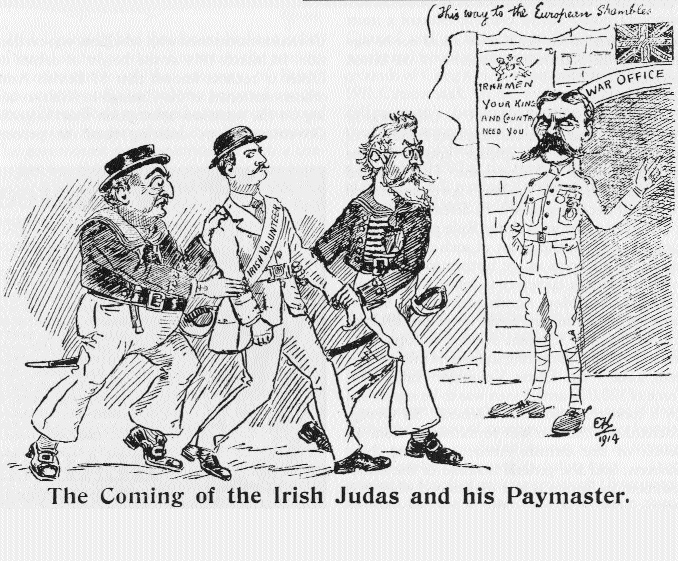
Cartoon critical of Redmond’s commitment to offer the Irish Volunteers for the European war. (Irish Worker)
On 25 October Redmond did revive reconciliation for the nationalists of Orange Belfast. However, he did this within a triumphalist analysis that weakened its thrust:
As far as the main issue is concerned, it is settled and won… Let us Irishmen of all politics and all creeds put aside these differences which have been dividing us in the past, and unite to perform a common duty which we owe to our common country, namely of defending Ireland as an autonomous nation within the Empire, and to take our stand by the side of self-governing Canada, by the side of self-governing Australia, by the side of self-governing New Zealand, by the side of self-governing Africa [sic] and to recognise that we, like them, are at least an autonomous portion of this empire, and that this empire belongs to us, as it does to them.
Military considerations
On the same day, at Pallasgreen, Co. Limerick, John Dillon declared the Home Rule Act ‘the best charter of liberty that Ireland has ever been offered’. Increasingly, reconciliation was not only being smothered with triumphalism but replaced by something diametrically opposed. This was stimulated by the military situation. The Ulster Volunteers who joined the British Army formed their own division, while the National Volunteers had to join existing units. This was not just a matter of prestige. It meant that the nationalists went straight to the front whilst the unionists remained in training and might do so until the expected early peace, when they would have an immediate advantage against the dispersed nationalist forces.
Irish Party orators began to speak of the National Volunteers not as comrades-in-arms of the Ulster Division but as protectors of Home Rule against it. At the Pallasgreen meeting mentioned, P.J. O’Shaughnessy MP (Limerick West) warned that ‘we must be ready for peace or war’. On 15 November John O’Dowd MP (Sligo South) promised ‘no concessions to Carson’. A fortnight later, John Hackett MP (Tipperary, Mid.) insisted on the National Volunteers’ ‘duty to maintain the supremacy of the National Parliament at College Green’.
Though the war failed to end by Christmas, still the Ulster Division did not go to the front. On 16 January 1915 William Doris MP (Mayo West) mentioned reconciliation only to pour cold water on it: ‘The Orangemen may start their usual swaggering and may threaten to wreck Home Rule. We must be prepared for that.’ The same message was repeated by O’Dowd at the end of February, and two weeks later by Hackett. Then, at Claremorris on 26 March, Dillon summarised the argument:
Does any sane man doubt that if after the war is over and peace is proclaimed the national forces were found to be disintegrated and broken up in factions, and we came forward with no strong, organised national force behind us, relying only on proposals of reconciliation and conference with the Unionist leaders in Ireland—does any sane man doubt we would be spurned with contempt, and that our proposals of peace and conciliation would be thrown in our faces and that these men would be encouraged to fresh outrages in the shape of bullying and threats of civil war in order to repeal the Home Rule Act and, in the elegant and classical phrase of General Richardson, consign Home Rule to the devil?
Over the following three months, Redmond, his brother and son addressed meetings in and around Dublin. In this tour only Willie Redmond mentioned reconciliation, and then only once.
Unionists in government
Before they had finished, Redmond had a new worry. At the end of May the Liberal government was re-formed as a coalition with the Unionists. They demanded conscription. The Irish Party opposed this.
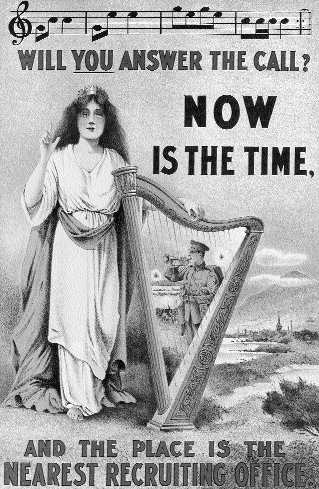
British army recruitment poster. (E.T. Archive)
Conscription of Ireland would be at once a breach of the spirit of Home Rule, an exposure of its limitations and a way to drain from the country many younger sons while the Protestants of industrial Belfast stayed in their protected jobs.
The Party emphasised even more the adequacy of the National Volunteers to fight both Germans and, if necessary, conscription. On 13 June Condon warned lest that ‘movement go to pieces’. On 27 June Thomas Lundon MP (Limerick East) insisted:
Nationalist Ireland must be prepared to avenge the honour of their country before they would allow the Orange hordes [sic] from the north to undo the work which her forefathers had fought and suffered and died for.
He warned, too, that the coalesced British parties might block Home Rule.
This was going too far. In Dublin, on 8 July, Redmond mocked this idea. Ten days later, Cullinan in Aherlow reassured his constituents:
It was not in the power of England, in face of the purpose for which she entered into this great war with Germany, namely in defence of small nationalities and for recognition of treaties—it was not in the power of England in face of this to remove Home Rule from the statute book.
At Waterford, on 23 July, Redmond added a further pledge against a dilution of Home Rule: ‘No Amending Bill can be introduced until after the Home Rule Act has come into operation. (Applause)’. On 29 July, the veteran MP for Armagh South, Dr Charles O’Neill, supported this: ‘The Irish Party has made home rule an accomplished fact (Cheers) and it will inevitably become the law of the land. (Renewed cheers)’. These promises were given the more readily because of the ending of one worry. On 8 July the Ulster Division had embarked for the front. On 17 August, at Letterkenny, Devlin tried to revive reconciliation. He gave two examples of prestigious, though not influential, Unionists being softened towards Home Rule by the example of the National Volunteers.
Meanwhile, though the Ulster Division was less of a threat, the Nationalist MPs felt more the danger from their other flank: the continuing existence of MacNeill’s Irish Volunteers. In his Aherlow speech Cullinan abused them:
We had . . . a number of pro-German disturbers in Ireland who were trying to create trouble. They belonged to that class of people in Ireland who never did anything but talk and criticise. If the Irish people were foolish enough to listen to these critics and to allow dissension to come in among them then the English Party would be perfectly justified in refusing to have the Home Rule Act put into operation.
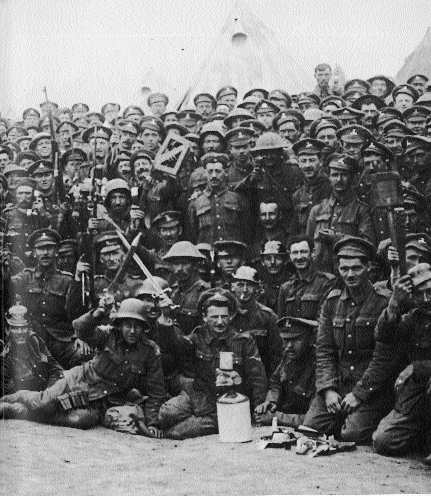
Men of the Royal Dublin Fusiliers on the Western Front proudly display their collection of captured German arms and helmets. (Imperial War Museum, London)
On 10 October, Hackett asked:
Why don’t those people who spoke as if they were ready to die for Germany get across the frontier and fight for Germany? The plain answer was that they don’t want to fight.
Three weeks later, at Kilkenny, J.T. O’Donovan MP (Wicklow West) added: ‘They had the so-called exponents of physical force talking revolution, but doing nothing’.
Threat of conscription
The other fear remained conscription. Richard McGhee MP (Mid-Tyrone) had declared at Omagh on 29 September that ‘the Irish Party can save Britain as well as Ireland from conscription’. He did not outline a strategy for this. A month later, at Kilkenny, Devlin defined conscription as ‘the right to apply Prussian methods in dealing with the democratic forces of the country’. At Maryborough on 1 November he repeated this racial identification. In neither case did he mention that it was also the method favoured by his ally, France. In turn, this meant emphasising German iniquity: ‘If the despots of Prussia succeed in this war, Ireland will undoubtedly share the fate of Poland and Belgium’.
In January 1916 conscription was passed for Britain only. The Irish Party seems to have expected that recruiting, which had begun to decline, would revive as it had done after the departure of the Ulster Division. This did not occur. On 2 February, at Galway, John Redmond tried to rally support:
If this war ends in the defeat of the allies there is imminent danger that every tenant-farmer in Ireland will be robbed of his ownership of the soil. (Applause)
He pointed to the moral of Irish exclusion from conscription:
The exclusion of Ireland from the recent Conscription Bill creates a new and heavy obligation upon the Irish people to do their duty under the voluntary system.
Recruitment continued to flag and so did Redmondite oratory. It is possible that the Irish Party supporters had ideas to deal with the developing crisis. Certainly, on 20 March at Tullamore, Co. Offaly (a town represented by an Independent Nationalist), they acted, physically attacking the MacNeillites, who repulsed them.
The next month, the Easter Rising exposed nearly all Redmond’s wartime propaganda. The aftermath showed the Irish Party as futile on matters of life, death and nationality. Ireland was not in the same position as ‘self-governing Canada’ and the other dominions. Germany might not be so much worse than Britain. The Irish Volunteers had shown their readiness to fight.
In July, one last propaganda bubble was exploded. In a desperate bid for immediate Home Rule, the Irish Party offered the Unionists the temporary exclusion from the measure of the six north-eastern Ulster counties: a surrender to the ‘Orange hordes’. Stephen Gwynn was to admit that ‘that day really finished the constitutional party and overthrew Redmond’s power’. For the first time since the 1870s, nationalists en masse looked for an alternative to Home Rule. This was being prepared in Frongoch. The rhetoric of Redmondism had been used too long to discipline its followers. Now they had come to see through it.
D.R. O’Connor Lysaght is a writer and historian.
Further reading:
P. Bew, Ideology and the Irish Question (Dublin, 1995).
D. Gwynn, Life of John Redmond (London, 1932).
S. Gwynn, John Redmond’s last years (Dublin, 1919).
















